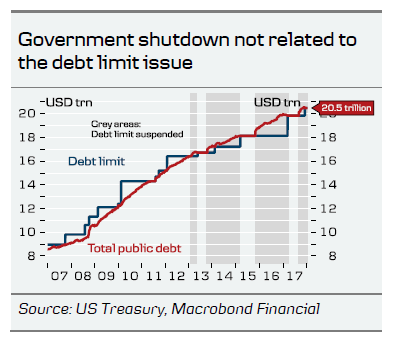Today the Republicans and the Democrats agreed on a short-term funding bill expiring on 8 February in an attempt to get more time to negotiate the immigration reform. The deal means that the government opens on Tuesday. It seems like the Democrats were concerned about losing support, as a shutdown is very unpopular among voters and the mid-term election is coming up in November.
The question is now whether the two sides can reach a bipartisan deal on immigration, something we have to follow over the coming weeks. At the moment it seems merely like kicking the can down the road but clearly US politics is difficult to predict, even when President Trump is not the centre of attention.
As the shutdown only lasted a few days, there are no real economic costs and thus we still believe the Fed is on track to deliver a hike in March. Given that we might face another shutdown beyond 8 February, we stress that the longer a shutdown lasts, the greater the consequences. For more on the economic consequences of a shutdown
Remember that a government shutdown is not related to the debt limit issue. The suspension of the debt limit expired on 8 December and the debt limit was reinstated at USD20,456bn. The reason why the US Treasury can still issue government bonds is that it is using so-called ‘extraordinary measures’, which basically means swapping non-marketable debt (held by the government itself) to marketable debt (held by the public) so that total debt is unchanged. The extraordinary measures will be exhausted in the spring and if the debt limit is not lifted, re-suspended or removed altogether, the US will default on its debt. Neither the Democrats nor the Republicans want a US default (which would result in a major financial crisis with much greater real economic costs than during a government shutdown) and we expect a solution to be found eventually, not least now the Republicans have passed a government deficitfinanced tax reform.

